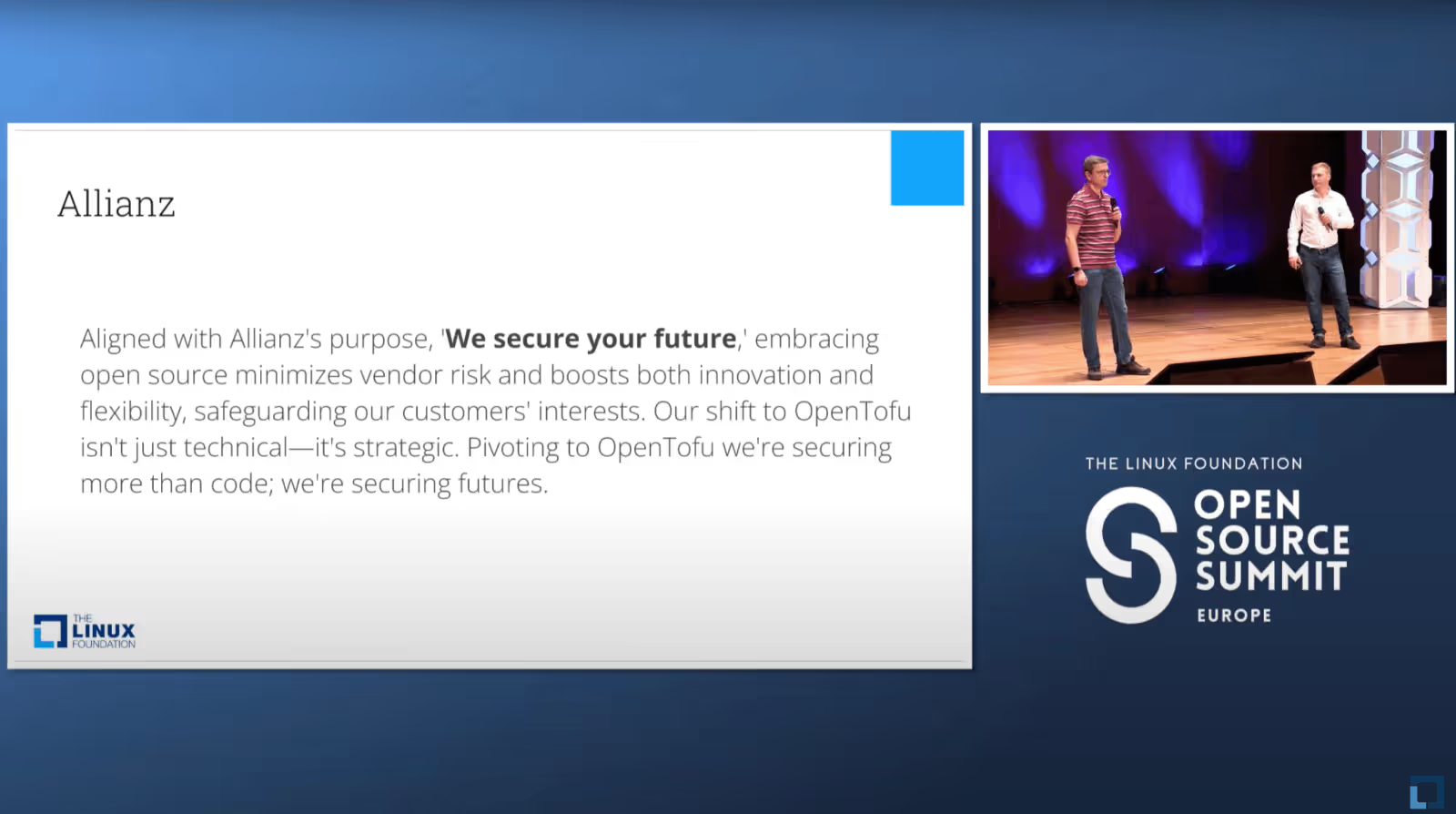

The Open Source Summit this year really came at quite the time. The community is truly walking in terra incognita on the heels of OpenTofu’s rise and Terraform’s license change. The issue clearly dominated the thoughts of the speakers, but keynote presentations delivered their own share of news and insights that will have an impact for the foreseeable future.
These are just a few of the things that I personally found interesting from such a long but varied keynote presentation.
1. The Open Source Model is More Resilient Than I Thought
Throughout the keynote, multiple appearances from open-source software (OSS) contributors and enterprise execs showed both a commitment to and maybe even dependency on open-source models for software development. Crowdsourced projects are so pervasive now that they are both impossible to ignore and are embedded into many companies’ own strategies for growth.
Examples were pervasive throughout the conference. For one, Terraform’s licensing change sent ripple effects throughout the business world, provoking an enthusiastic response for OpenTofu.
Other noticeable effects were the several major initiatives that are turning lofty goals into accessible action items. New foundations are forming based on the success (and clear influence) of others like the Linux Foundation and the CNCF.
2. BSL License Changes Could Be A Blessing In Disguise
They’re definitely not good per se, but it’s important to put into perspective just how much risk the BSL license change poses to the free and open-source software (FOSS) ecosystem’s future.
This was Jim Zemlin’s premise on stage when he whipped out a graph showing only nine instances of “a commercial company that owned the copyright in a popular open source project, that changed it from an open-source license to a commercial license.”
The number is much more modest than I expected. That said, I don’t want to minimize the impact of who made these changes: Elastic.co, Hashicorp and other there are all BIG names with consequential software in the industry.
Notably, Elastic’s change brought about OpenSearch, backed by AWS, and this strongly parallels what’s happening now with HashiCorp and OpenTofu. So the context here is important, and the number of companies is only a part of a bigger story, and sometimes closing the door means opening a window (or a fork).
It’s also worth noting that having full copyright control over something was a big qualifier here, so less-than-total changes weren’t on the list. For instance, this ends up excluding Red Hat’s unpopular changes to its Linux distribution in July (and a $10 million commitment from SUSE to fork that distro). In 2020, Anaconda introduced a version with a commercial license that capped how many downloads you could make for free.
3. Allianz and ExpressVPN Plan to Migrate to OpenTofu
These are the two big names to join the project. Terraform’s license change took the business world by surprise, forcing companies to think fast and to follow their engineers’ lead in forming an open-source response.

Reps from Allianz and ExpressVPN took the stage to talk about how the Terraform announcement pushed them into the arms of OpenTofu as well as doubling down a commitment to other open-source projects. ExpressVPN brought up how it open-sourced its own VPN protocol, Lightway.
The most important quote came from Allianz’s David Bejar (and should be quoted by other pro-OSS companies going forward):
“We had invested millions of euros developing Terraform code. So when there was this change of license, we were wondering, ‘Is this still the right way to secure the future of our customers... Now with the announcement of OpenTofu, we are so happy to be contributing and to pivot to OpenTofu.”
4. The UXL Foundation (Unified Acceleration Foundation)
With the growth of LLMs, demand for accelerated computing is eclipsing that for general-purpose computing. As a result, there’s a new initiative to organize accelerated computing development as the industry breaks out.
The foundation unifies standards around accelerated computing and already includes Samsung, Google Cloud, Intel, Qualcomm, Fujitsu, Imagination, and Arm. It’s an outgrowth of the oneAPI initiative that has pushed for standardizing API specs for open-source projects.
.avif)
5. The Linux Foundation Committing to Sustainability
It was unexpected to hear how open-source software is actually having a measurable influence in fighting poverty and hunger, among other objectives. The Linux Foundation has noticed that their incubated projects are having that kind of impact, now aligning itself with contributing to the United Nations Sustainable Development Goals (SDGs).
Linux presented its Open Source for Sustainability report, using it to map how its open-source projects can make a direct impact in reducing poverty, satiating hunger, and accessing education. The list of organizations and companies contributing to those projects includes the AgStack Foundation and OS-Climate.
6. Governments are Investing into Open Source
Fiona Krakenburger and Tara Tarakiyee spoke about Germany’s Sovereign Tech Fund, contributing around €3.5 million per year to major infrastructure projects. They also offer €300,000 for companies/organizations participating in special challenges to sure up FOSS developer tools, software production, and infra documentation.
It only launched in 2022, born from Germany’s realization that open-source-based infrastructure was everywhere or that open-source tech is really at the heart of pervasive software that’s having an impact culturally and in people’s day-to-day lives.
Their biggest contribution to date has been a €875,000 grant to the OpenJS Foundation to bolster the Javascript ecosystem in particular. They’ve also given to OpenSSH, Bundler/RubyGems, Fortran Lang, OpenBGPd, OpenMLS, Wireguard, Curl, SequoiaPGP, and OpenPGP.js.
It’s refreshing — and a relief — to know the role of OSS is finally getting a chance to shine. Open-source is reliant on the time and resources volunteers have, and the growth of public funding is a sure sign it can become a permanent budget priority for other countries around the world.
Bonus: Hearing Community Reactions to OpenTofu
I didn’t get to Bilbao in person but my colleagues were there as reps for the OpenTofu project, including Omry Hay — our CTO who is now part of the project’s steering committee.
One of the things they did was to interview some of the experts from across the industry who were on hand at the conference, asking them about their thoughts and hopes for the Terraform fork. Here is what they had to say:
I think this takeaway from Andrew Martin, the CEO of ControlPlane, wraps things up nicely for me:
“It is the community's imperative to take that code that sits open and in the commons and do with it as they will…to open up the fork for the free usage of everybody and to move the project forward in the way that the community desires.”

.webp)




